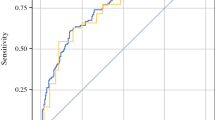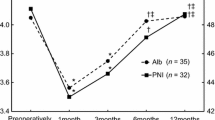Abstract
Background
This study aimed to identify factors influencing postoperative weight loss ≥15 % in long-term survivors after esophageal cancer surgery.
Methods
A population-based study was conducted in Sweden between 2001 and 2005, with regular follow-up for 5 years. Current weight, weight at operation, and average weight were assessed and dichotomized as weight loss of ≥15 %. Logistic regression estimated relative risks of weight loss between pre- and 5 years postoperatively, expressed as odds ratios (ORs) with 95 % confidence intervals (CIs). Statistically significant differences in nutritional symptoms between weight loss groups were analyzed using linear regression models to likewise test as risk factors.
Body mass index (BMI) at operation (< or ≥25), sex, and preoperative weight loss (< or ≥10 %) were tested as risk factors. Nutritional symptoms were selected from the European Organisation for Research and Treatment of Cancer (EORTC) QLQ-C30 and QLQ-OES18, including fatigue, nausea and vomiting, dyspnoea, appetite loss, diarrhea, and dysphagia, eating difficulties, reflux and pain.
Results
A total of 117 patients were included. Patients with preoperative BMI ≥25 were at a threefold increased risk (OR 3.2; 95 % CI 1.4–7.3) for postoperative weight loss of ≥15 % 5 years after operation. Moreover, eating difficulties, pain, fatigue, nausea and vomiting, and appetite loss were clinically relevant and statistically significantly worse symptoms experienced among those with a weight loss of ≥15 % (all at p < 0.05).
Conclusions
Overweight at the time of operation is associated with postoperative weight loss from a long-term perspective. Several nutritional symptoms are associated with weight loss of >15 % 5 years postoperatively.

Similar content being viewed by others
References
Lindblad M, Rodriguez LA, Lagergren J. Body mass, tobacco and alcohol and risk of esophageal, gastric cardia, and gastric non-cardia adenocarcinoma among men and women in a nested case-control study. Cancer Causes Control. 2005;16:285-94.
O’Doherty MG, Freedman ND, Hollenbeck AR, et al. A prospective cohort study of obesity and risk of oesophageal and gastric adenocarcinoma in the NIH-AARP diet and health study. Gut. 2012;61:1261-8.
Bollschweiler E, Herbold T, Plum P, et al. Prognostic relevance of nutritional status in patients with advanced esophageal cancer. Expert Rev Anticancer Ther. 2013;13:275-8.
Gupta R, Ihmaidat H. Nutritional effects of oesophageal, gastric and pancreatic carcinoma. Eur J Surg Oncol. 2003;29:634-43.
Lagergren J, Lagergren P. Oesophageal cancer. BMJ. 2010;341:c6280.
Laviano A, Meguid MM, Rossi-Fanelli F. Cancer anorexia: clinical implications, pathogenesis, and therapeutic strategies. Lancet Oncol. 2003;4:686-94.
Bozzetti F. Nutritional support in patients with oesophageal cancer. Support Care Cancer. 2010;18 Suppl 2:S41-50.
Ravasco P, Monteiro-Grillo I, Vidal PM, et al. Nutritional deterioration in cancer: the role of disease and diet. Clin Oncol (R Coll Radiol). 2003;15:443-50.
Djarv T, Lagergren J, Blazeby JM, et al. Long-term health-related quality of life following surgery for oesophageal cancer. Br J Surg. 2008;95:1121-6.
Darling GE. Quality of life in patients with esophageal cancer. Thorac Surg Clin. 2013;23:569-75.
Martin L, Lagergren P. Long-term weight change after oesophageal cancer surgery. Br J Surg. 2009;96:1308-14.
Viklund P, Lindblad M, Lu M, et al. Risk factors for complications after esophageal cancer resection: a prospective population-based study in Sweden. Ann Surg. 2006;243:204-11.
Lagergren J, Bergstrom R, Lindgren A, et al. Symptomatic gastroesophageal reflux as a risk factor for esophageal adenocarcinoma. N Engl J Med. 1999;340:825-31.
Sobin LH, Wittekind C. TNM classification of malignant tumours. New Jersey: Wiley; 2002.
Siewert JR, Stein HJ. Classification of adenocarcinoma of the oesophagogastric junction. Br J Surg. 1998;85:1457-9.
Aaronson NK, Ahmedzai S, Bergman B, et al. The European Organization for Research and Treatment of Cancer QLQ-C30: a quality-of-life instrument for use in international clinical trials in oncology. J Natl Cancer Inst. 1993;85:365-76.
Blazeby JM, Conroy T, Hammerlid E, et al. Clinical and psychometric validation of an EORTC questionnaire module, the EORTC QLQ-OES18, to assess quality of life in patients with oesophageal cancer. Eur J Cancer. 2003;39:1384-94.
Martin L, Jia C, Rouvelas I, et al. Risk factors for malnutrition after oesophageal and cardia cancer surgery. Br J Surg. 2008;95:1362-8.
Martin L, Lagergren J, Lindblad M, et al. Malnutrition after oesophageal cancer surgery in Sweden. Br J Surg. 2007;94:1496-500.
Lochs H, Allison SP, Meier R, et al. Introductory to the ESPEN Guidelines on enteral nutrition: terminology, definitions and general topics. Clin Nutr. 2006;25:180-6.
Lis CG, Gupta D, Lammersfeld CA, et al. Role of nutritional status in predicting quality of life outcomes in cancer: a systematic review of the epidemiological literature. Nutr J. 2012;11:27.
Fayers PM, Aaronsson NK, Bjordal K, et al. The EORTC QLQ-C30 scoring manual. Brussels: European Organisation for Research and Treatment of Cancer; 2001.
King MT. The interpretation of scores from the EORTC quality of life questionnaire QLQ-C30. Qual Life Res. 1996;5:555-67.
Osoba D, Rodrigues G, Myles J, et al. Interpreting the significance of changes in health-related quality-of-life scores. J Clin Oncol. 1998;16:139-44.
Lagergren K, Mattsson F, Lagergren J. Abdominal fat and male excess of esophageal adenocarcinoma. Epidemiology. 2013;24:465-66.
Muscaritoli M, Molfino A, Gioia G, et al. The “parallel pathway”: a novel nutritional and metabolic approach to cancer patients. Intern Emerg Med. 2011;6:105-12.
Kiyama T, Mizutani T, Okuda T, et al. Postoperative changes in body composition after gastrectomy. J Gastrointest Surg. 2005;9:313-9.
Donohoe CL, McGillycuddy E, Reynolds JV. Long-term health-related quality of life for disease-free esophageal cancer patients. World J Surg. 2011;35:1853-60.
Derogar M, Lagergren P. Health-related quality of life among 5-year survivors of esophageal cancer surgery: a prospective population-based study. J Clin Oncol. 2012;30:413-8.
Jones LW, Demark-Wahnefried W. Diet, exercise, and complementary therapies after primary treatment for cancer. Lancet Oncol. 2006;7:1017-26.
Johns N, Greig C, Fearon KC. Is tissue cross-talk important in cancer cachexia? Crit Rev Oncog. 2012;17:263-76.
O’Flynn J, Peake H, Hickson M, et al. The prevalence of malnutrition in hospitals can be reduced: results from three consecutive cross-sectional studies. Clin Nutr. 2005;24:1078-88.
Baldwin C, Weekes CE. Dietary counselling with or without oral nutritional supplements in the management of malnourished patients: a systematic review and meta-analysis of randomised controlled trials. J Hum Nutr Diet. 2012;25:411-26.
Carey S, Storey D, Biankin AV, et al. Long term nutritional status and quality of life following major upper gastrointestinal surgery: a cross-sectional study. Clin Nutr. 2011;30:774-79.
Wainwright D, Donovan JL, Kavadas V, et al. Remapping the body: learning to eat again after surgery for esophageal cancer. Qual Health Res. 2007;17:759-71.
Stratton RJ, Green CJ, Elia M. Disease-related malnutrition: an evidence-based approach to treatment. Wallingford: Cabi Publishing; 2003.
Johansson J, Walther B. Clinical outcome and long-term survival rates after esophagectomy are not determined by age over 70 years. J Gastrointest Surg. 2000;4:55-62.
Deans DA, Tan BH, Wigmore SJ, et al. The influence of systemic inflammation, dietary intake and stage of disease on rate of weight loss in patients with gastro-oesophageal cancer. Br J Cancer. 2009;100:63-69.
Fontaine KR, Barofsky I. Obesity and health-related quality of life. Obes Rev. 2001;2:173-82.
Carey S, He L, Ferrie S. Nutritional management of patients undergoing major upper gastrointestinal surgery: a survey of current practice in Australia. Nutr Diet. 2010;67:219-23.
Ravasco P, Monteiro-Grillo I, Vidal PM, et al. Cancer: disease and nutrition are key determinants of patients’ quality of life. Support Care Cancer. 2004;12:246-52.
Malmström M, Ivarsson B, Johansson J, et al. Long-term experiences after oesophagectomy/gastrectomy for cancer: a focus group study. Int J Nurs Stud. 2013;50:44-52.
Fearon KC, Jenkins JT, Carli F, et al. Patient optimization for gastrointestinal cancer surgery. Br J Surg. 2013;100:15-27.
Conflict of interest
None declared.
Author information
Authors and Affiliations
Corresponding author
Rights and permissions
About this article
Cite this article
Martin, L., Lagergren, P. Risk Factors for Weight Loss Among Patients Surviving 5 Years After Esophageal Cancer Surgery. Ann Surg Oncol 22, 610–616 (2015). https://doi.org/10.1245/s10434-014-3973-2
Received:
Published:
Issue Date:
DOI: https://doi.org/10.1245/s10434-014-3973-2




